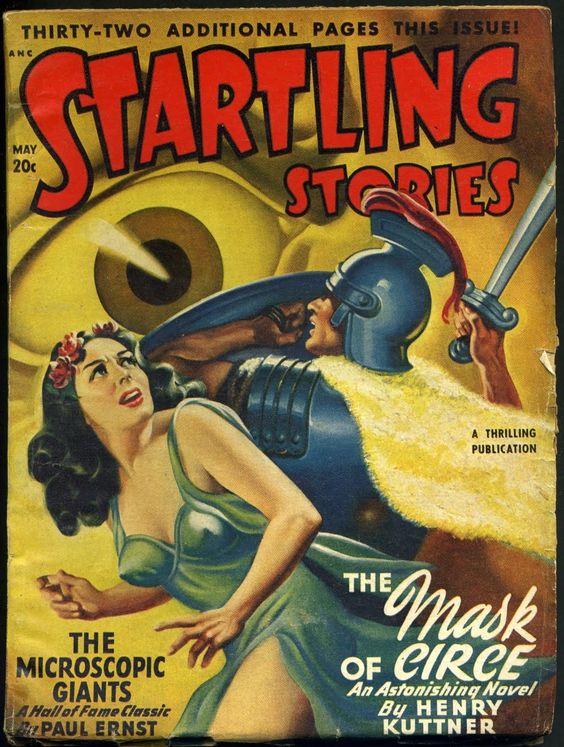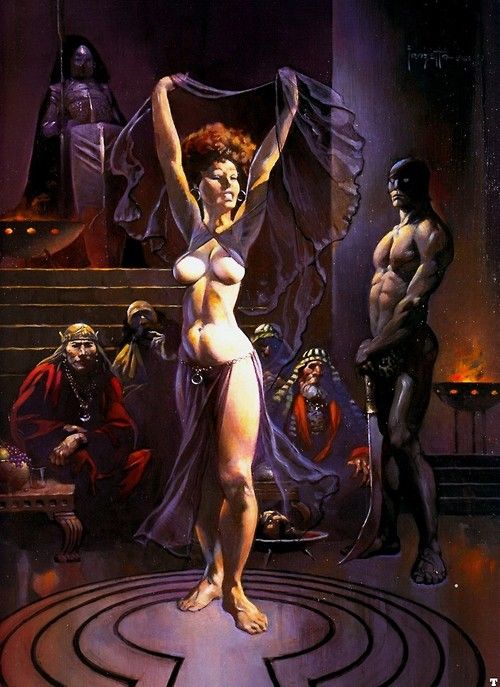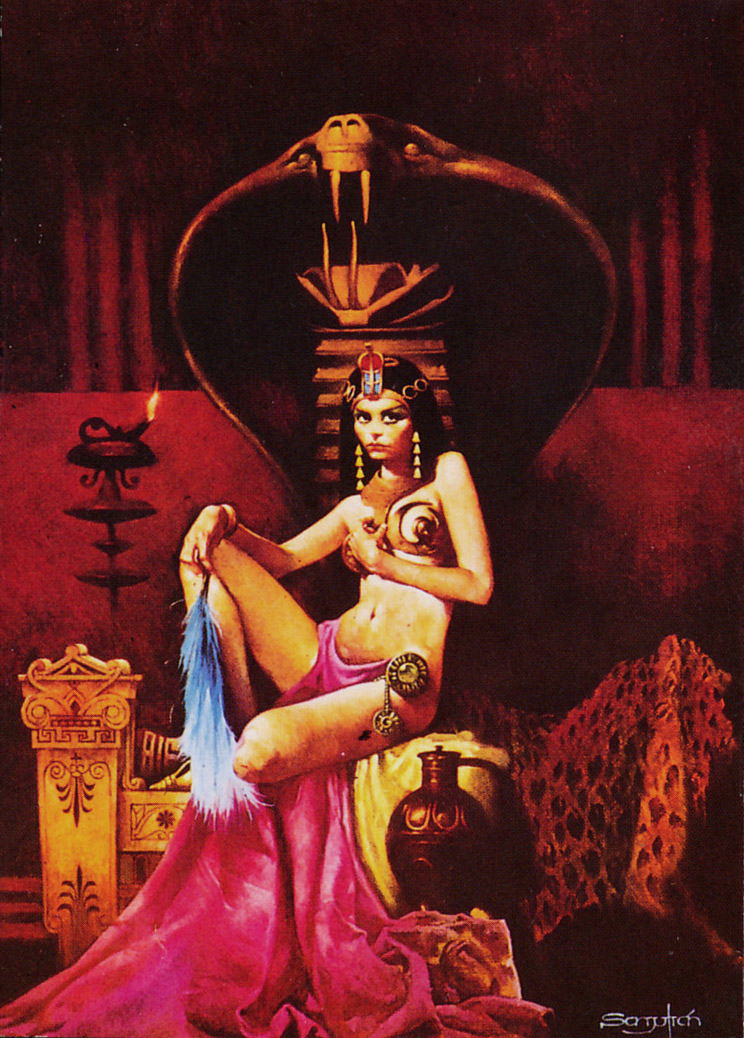SENSOR SWEEP: Emotionless Covers, Deeper Resonance, Inflammatory Posts, and Secretive Enclaves
Monday , 27, March 2017 Sensor Sweep 18 Comments Scientology (First Things) Science Friction — “Although some science-fiction writers, such as Isaac Asimov and Jack Williamson, considered it a scam and criticized it as unscientific, others—including John W. Campbell, the editor of Astounding, the most influential science-fiction magazine of its day—seemed convinced of its importance and validity.”
Scientology (First Things) Science Friction — “Although some science-fiction writers, such as Isaac Asimov and Jack Williamson, considered it a scam and criticized it as unscientific, others—including John W. Campbell, the editor of Astounding, the most influential science-fiction magazine of its day—seemed convinced of its importance and validity.”
Appendix N (Jon Del Arroz) Retro Review: Tarzan Of The Apes — “Then there’s the introduction in here, by a woman who is a sociology professor or something of the sort. The whole intro is devoted to slandering and talking down regarding Edgar Rice Burroughs — she even does the ridiculous internet argument tactic of tying him to Nazis. Ironic, as he spent most of the war as a correspondent writing about American patriotism, after he survived the Pearl Harbor bombing. It also talks down about pulp fiction and how it ‘differs from’ literary fiction, of which she gives a long list of negatives that are anything but. The introduction is a disaster and a disgrace. Between that and the emotionless cover, it screams to readers ‘DON’T READ THIS BOOK WE ONLY PUBLISHED IT CUZ HISTORY!'”
Furry Watch (Cirsova) Aldair, Across the Misty Sea — “Aldair is a pulp-style post-apocalyptic furry sword & seafarer science fiction. It could be that I jumped in on what turned out to be the third volume of a four volume series, but what left me gobsmacked was the appearance that it was written from a ‘place of furness’.”
Books (The Injustice Gamer) Injustice Book RANT: Aye, Robot by Robert Kroese — “This book is FUN. Yes, people are comparing it to Hitchiker’s Guide to the Galaxy. You know what? I like this much better. Oh, don’t get me wrong, the former was a lot of fun to read, but I don’t find it worth revisiting. Why? most comedy doesn’t hold up as well on repeat visits, especially written word.”
Science Fiction (Black Gate) Space Viking by H. Beam Piper — “There are dated elements, or at least some that might strike a modern reader that way. Nearly everybody smokes, some even pipes. Technology, while the details are kept fairly vague, seems very much analog, not digital. In other Future History stories women play significant roles, but not so in this book. I suspect it is an indicator of the nature of Sword Worlder society. Women clearly serve in combat and political roles on many of the planets Trask raids and trades with, but except for his dead bride and his unnamed doctor, we see few other Sword Worlder women.”
Science Fiction (Stuff I Like) H. Beam Piper — “The difference between Piper’s dark ages and empires and, say, Asimov’s, is that Piper isn’t just using about them to tell a cool story. Though he wrote in solid, pulp space opera-style, he was really intent on exploring the fragility of human civilization. He doesn’t do it with all that much complexity, but he does it well enough to give a deeper resonance to what might otherwise be just some more space opera adventures (albeit, very good ones).”
Appendix N (Jon Del Arroz) Retro Review: The Ginger Star by Leigh Brackett — “While figuring out what to read next, I picked this up, because of its short 186 pages, a bit longer than a novella by today’s standards. However, it had the plot and action of a 500-600 page epic fantasy. Complete with a map in the front, a travel up a trail through barren wastelands and into frozen tundra, we get the full gambit of classic adventure here. The cool twist is that while this has a fantasy world, it’s one that’s dying where the powers that be are quite afraid of the pending revolution that will come due to an influx of new beings from the stars.”
 Traveller (Tales to Astound!) TRAVELLER: Out of the Box–Another Difference Between the 1977 Edition and the 1981 Edition — “During the game line’s development the rules changed, the OTU was developed, and the game and the setting became one thing. My view of what sort of environment the Traveller rules originally implied became erased. When I would say, ‘The Spinward Marches seems safer and more civilized than I want,” I would be met with the reply, ‘How can you say that? It’s on the edge of the Imperium. There’s all sorts of adventure.’ Which is true, by the way. There is all sorts of adventure in The Spinward Marches. Nonetheless, to me, with all its mega corporations with tendrils to the smallest and off the beaten path worlds, its empire capable of interdicting entire star systems, its vast fleet of enormous startups that utterly dwarfed the ships of the player characters, its all seemed a much different environment than those I remembered reading about when I first bought the rules. Overall, the Third Imperium enforced a law and order across the stars that wasn’t in alignment with my sensibility for Science-Fiction Adventure in the Far Future.”
Traveller (Tales to Astound!) TRAVELLER: Out of the Box–Another Difference Between the 1977 Edition and the 1981 Edition — “During the game line’s development the rules changed, the OTU was developed, and the game and the setting became one thing. My view of what sort of environment the Traveller rules originally implied became erased. When I would say, ‘The Spinward Marches seems safer and more civilized than I want,” I would be met with the reply, ‘How can you say that? It’s on the edge of the Imperium. There’s all sorts of adventure.’ Which is true, by the way. There is all sorts of adventure in The Spinward Marches. Nonetheless, to me, with all its mega corporations with tendrils to the smallest and off the beaten path worlds, its empire capable of interdicting entire star systems, its vast fleet of enormous startups that utterly dwarfed the ships of the player characters, its all seemed a much different environment than those I remembered reading about when I first bought the rules. Overall, the Third Imperium enforced a law and order across the stars that wasn’t in alignment with my sensibility for Science-Fiction Adventure in the Far Future.”
Don’t Be Mean (The Injustice Gamer) On not quite fitting into the movements — “Now, part of this is because Jeffro and Daddy Warpig like writing great inflammatory posts full of hyperbole. They’re making a point, and part of that is blowing some things out of proportion. This is the same school of rhetoric as POTUS, so study that a bit first if you have trouble with it in sff.”
D&D (Autarch) An Introduction to Eldritch Magic! — “Magic in heroic fantasy is more subtle than the spectacular effects which are commonplace in traditional ACKS games. Spells tend to work with the existing environment, rather than conjure effects from thin air. Enchantments and illusion are commonplace, while elemental blasts are less so. This subtle, but powerful magic, is called eldritch magic, and it constitutes a new type of magic that has facets of both arcane and divine magic.”
Meanwhile… (The Verge) Sci-fi author John Scalzi on the future of publishing — “I am a cockroach. I aspire to be a cockroach. But in all honesty, what that means is that as a writer, you have to recognize that nothing lasts and things change, that there’s no one time in the history of publishing where everything was one way, and then all of a sudden there was change. It’s always changing. So we will definitely try new things to see if they work. And if they don’t, you don’t do them again, or you wait for the market to come around to them again, whatever. I’m totally open to that.”
Short Fiction (Cirsova) File the Serial Numbers Off — “Don’t use elves or Cthulhu as a crutch! Yeah, I know that Cthulhu is a cottage industry, but I can tell you right now that your stories will improve by at least %15 or your money back if your evil monster beyond the gates is Uhlthuc and your similar-but-different elves are ‘the Velse’. (Note: If you submit a story using the names Uhlthuc and ‘the Velse’ and I accept them on merits of story, I reserve the right to withhold the per-word bonus on the first 2500 words; file those serial numbers off harder!)”
 Star Wars (RMWC Reviews) Legends Never Die: Splinter of the Mind’s Eye — “Despite the smaller scale, the plot ends up being pulpy as hell. Luke & Leia travel to the Circarpous system to recruit for the Alliance when technical troubles cause them to crash land on the swampy planet Mimban. Braving wildlife, they find an Imperial controlled mining town, get captured by the local Captain-Supervisor, Grammel, escape, and join a strange old woman, Halla, on her search for a powerful Force artifact called the Kaiburr Crystal. And then Darth Vader shows up for a showdown in an ancient temple of Totally-Not-Cthulhu.”
Star Wars (RMWC Reviews) Legends Never Die: Splinter of the Mind’s Eye — “Despite the smaller scale, the plot ends up being pulpy as hell. Luke & Leia travel to the Circarpous system to recruit for the Alliance when technical troubles cause them to crash land on the swampy planet Mimban. Braving wildlife, they find an Imperial controlled mining town, get captured by the local Captain-Supervisor, Grammel, escape, and join a strange old woman, Halla, on her search for a powerful Force artifact called the Kaiburr Crystal. And then Darth Vader shows up for a showdown in an ancient temple of Totally-Not-Cthulhu.”
Appendix N (By This Axe I Rule) Into the Vaults: We always wanted to play Aragorn — “The official D&D ranger continues to evolve, leaning this way and that, and I continue to evaluate ranger classes (and the games they are a part of) through the lens of Aragorn. But as difficult (if not impossible) as it is to get a ranger class right, turns out, that’s not enough. Aragorn isn’t Aragorn without the Dúnedain, the Rangers of the North, Narsil and much more. Aragorn isn’t a class, he’s a very important thread in the rich tapestry that is Tolkien’s Middle-earth. To play a similar thread, you need a similar tapestry. That’s why I’m passionate about the Heroic Fantasy Handbook, which provides Judges with the tools to weave their own tapestry not unlike Middle-earth, wherein new threads not unlike Aragorn may flourish.”
Appendix N (PC Bushi) 3 Clever Cugel Campaign Ideas — “In Eyes of the Overworld, Cugel is burdened with an alien parasite named Firx. Basically, Firx’s job is to make sure Cugel does the job he was sent out to do. There are times when the creature suspects Cugel is shirking his assignment or dawdling. When this happens, the little beast flexes its barbs, which are wrapped around Cugel’s guts. At these times, the protagonist either has to give in to Firx’s wishes in order to stop the pain, or else convince it that he’s pursuing the best (or only) course of action available.”
History (SuperversiveSF) School of Darkness — Or How I Discovered That I Was Wrong About Everything! — “All these things, these things we all complain about but think is just ‘part of life’, this highly-organized, secret group were deliberately attempting to orchestrate. And they were really clever at it. Whenever anyone came up with a logical argument to make the bad thing sound like the moral high ground, they quickly shared it. Suddenly, that argument was the accepted view.”
Role-Playing (Autarch) Today’s Feature is a Bug! — “Like the cockroaches they resemble, bugmen are hard to kill. When a bugman is required to consult the Mortal Wounds table, the player may roll twice, and choose the preferred result to apply. The character also subtracts his class level from the number of days of bed rest required to recover…. However, bugmen are alien beings and thus suffer a -2 penalty to the reactions, loyalty, and morale of men, lizardmen, and geckomen. Conversely, they get a +2 bonus to the reactions, loyalty, and morale of their own kind.”
Role-Playing (Gaming Ballistic) GURPS, HUH! What is it good for . . . ? — “People say that GURPS is a ‘realistic’ system, and there’s an element of truth to it. People say that GURPS is a ‘simulationist’ system, and well, it can be. But where GURPS shines, and is at its strongest, is in the realm of verisimilitude. What is that? ‘The appearance of being true or real.’ GURPS strength isn’t ‘realism,’ because it’s perfectly plausible and fun and doable to play over-the-top supers in GURPS. My character The Commander in Christopher Rice’s Aeon Campaign is a Captain America type. He can probably bench press 1,250 lbs, and is a fantastic fighter, and has telekinetic powers and some spiffy magical abilities that are nascent. But when all is said and done, when he does something, the response is ‘I can see how that would happen.’ GURPS is grounded in this, the ‘seeming of reality,’ in a way that is mostly fantastic.”
 Music (Amatopia) Pulp Rock — “Read Pitchfork, for example. Music is judged on its socio-political impact as much, if not more, than the notes involved. Radiohead has been ass for over a decade, but they’re still ‘vital’ and ‘important.’ To whom? Rock music needs something like the Pulp Revolution that’s going on in sci-fi and fantasy.”
Music (Amatopia) Pulp Rock — “Read Pitchfork, for example. Music is judged on its socio-political impact as much, if not more, than the notes involved. Radiohead has been ass for over a decade, but they’re still ‘vital’ and ‘important.’ To whom? Rock music needs something like the Pulp Revolution that’s going on in sci-fi and fantasy.”
Genre Wars (Misha Burnett) — Black Box Blues: Investigating Mission Critical Metaphysics In Fiction — “This book always seems to come up in Hard vs. Soft discussions…. It is, however, remarkably consistent in terms of the significance of the contrafactual elements to the story. The powers of the Bene Geserit are as important as the water cycle on Arrakis to the overall story. The sociological implications of the technological innovations–both the reasonable and the unreasonable ones–are thought out in great detail. And it is that depth of world-building that makes the story work and allows rigorous ecological detail to coexist with black box (literally in the case of the Reverend Mother’s ‘pain box’ test for humanity) magic.”
Short Fiction (Benjamin Cheah) Behind the Story: WE BURY OUR OWN — “Normally I would discuss the hows and whys of writing this story but I don’t think there was much of ‘me’ writing it. Not this time. I only made a few conscious decisions: incorporating sword and gun, how the world was set up, how the characters were seen and what defined them. Everything else… Call it God, intuition, the muses, whatever, but I got out of its way and let it do the writing. The resulting story was unlike anything I had ever done before. But it felt right. It was clean. Beyond a few edits for typos, no further changes were needed. When I sent it in to my writer’s group, there was nothing but praise. When I sent it to Baen, I received new response. Then I sent it to Silver Empire’s Lyonesse project. And it was accepted.”
Appendix N (Semper Initiativus Unam) Appendix N Madness Day 25: Lovecraft vs Burroughs — “Both Lovecraft and Burroughs looked at our solar system, but what they took away was infinitely different. Burroughs saw in Mars and later Venus places to set some rip-roaring adventures, full of strange civilizations. His Barsoom is a place rife with ruined cities and secretive enclaves, letting him build strange new creatures and customs into each adventure he wrote. It was a place where John Carter, his morality based on a long-past code of honor, could carve out an empire. When Lovecraft looked up he saw the ‘black seas of infinity’ between the stars. The discovery of Pluto in 1930 was not cause for wonder but a sign related to bizarre cosmic entities, in this case the fungi from Yuggoth. Being transported beyond the cozy confines of modern Earth in Lovecraft is not an adventure but a cause for horror and madness.”
This endless championing of Scalzi is really irrational and bizarre, especially considering the Tor’s current state.
There’s something that was mentioned at Vox’s blog recently, and that I’m surprised isn’t mentioned more. They actually have several authors who are both more productive, sell more and are better received by readers. You’d think that someone like Sanderson would be infinitely more valuable to Tor, given that he is much more prolific, sells considerably more, has much bigger fan base, and, judging by the user reviews alone, is better received by general readership. Yet it is Scalzi that gets the expensive, aggressive advertising, celebrity promotions, paid interviews…
-
You’re making the mistake of thinking Tor is being run like a business. It’s not. It’s a leftist ideology factory with the good fortune of having some decent authors on its payroll who can write and sell in order to support the money-losing message fiction. IMO Scalzi is being handed all these benefits because he’s a symbol, he’s the anointed one, he’s the anti-Vox, not because he’s better than the other authors or because he will ever make his advances back for the company.
-
This. Once the company is converged, financial interests leave the front seat and it is ideology that takes it.
-
Arrgh/yay! – A lot of folks freak out about the smoking in old books (Eric Flint edits most of it out in the Baen rereleases he edits), exclaiming that people don’t smoke much anymore. Whelp, that seems based on an assumption things stay the same, never changing – unless it’s something they’re in favor of.
I don’t know if it was intentional, but Piper’s take on elite technocrats is a direct shot across Asimov’s bow. Trask’s bemusement over learning what a social worker is, is priceless
-
I keep seeing that. I mean, take a look at GR reviews for any older work and chances are that you’ll stumble on someone being perplexed/amused/weirded by either the protagonist’s constant smoking or the fact that characters in general often smoke.
I can imagine that as being specific of some parts of the world. Where I’m from, smoking is still far from uncommon.
-
Only question is, “what” parts of the world? In my own neighborhood, every other guy is smoking. I can’t imagine that changing anytime soon.
I’m not a smoker, btw, but that’s how it is. So I can’t help but question where those people live, and where they grew up, if the very notion is borderline alien to them…
-
-
I love the stories where folks smoke on spaceships; even better when the author notes that it’s probably a bad idea, but the characters do it anyway, or the ship is specially set up to handle the fact that everyone in the crew smokes.
Yeah, I saw the same thing vis a vis Piper vs Asimov. Who looks more prescient now?
I can summon zero surprise that Flint would edit things that way.
-
Yeah, not surprising, but at least he got Laumer, Schmitz, and some other good B-listers back in print. Sometimes, I’ll settle for any sort of victory.
-
Hit up Amazon and Gutenberg for some more “raw” versions of Piper. Many free. Very little in his Terro-Future Human History that isn’t good.
Examples:
Space viking
Cosmic Computer-
Hard to go wrong with H. Beam Piper.
-
YES!! Back on the Sensor Sweep. Clawing my way back to providing more new content on GB after far too long head down in design. Woot.
Whoa . . . I was wondering why traffic for a four-day old post was suddenly spiking. Then I realized . . . I had made it!
Thanks for the link, Jeffro! I’m glad I’m not the only one who sees the need for other artistic mediums to have Pulp Revolutions of their own.
Sweet! Double entry on the Sweep! Thanks, Jeffro.
That parody cover of Beneath Ceaseless Skies is fantastic! I’m still laughing about it.
Then again, I’m probably somewhat bitter considering all of the rejections they gave me before Vox Day and his Dread Ilk helped me see the light. Now I know about the Appendix N/Pulp Axis of Awesomeness, something many a teacher and professor and blogger conspired to hide from me for decades.
Though, their rejection letters were pretty good, as far as those things go…
Thanks for the shoutout!
That First Things article is quite excellent. That uber-naive Enlightenment idealism of Clarke’s, with ye olde “Scientific world-view will eradicate all ills and rivalries” shtick reminds be of that recent Atlantic article, wherein the writer was shocked by the fact that, in this predominantly atheistic age, racism and nationalism and all sorts of violence appear to be more common and severe than ever.
Now I’m having trouble keeping up with all this! I need a couple more days this week…
